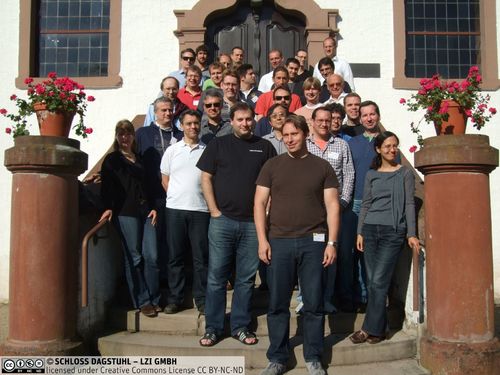Dagstuhl Seminar 11391
Public-Key Cryptography
( Sep 25 – Sep 30, 2011 )
Permalink
Organizers
- Marc Fischlin (TU Darmstadt, DE)
- Anna Lysyanskaya (Brown University - Providence, US)
- Ueli Maurer (ETH Zürich, CH)
- Alexander May (Ruhr-Universität Bochum, DE)
Contact
- Annette Beyer (for administrative matters)
Schedule
Cryptography is the science of protecting data in presence of malicious parties. Without cryptography e-commerce, e-banking and e-government would not be possible. Indeed, the most prominent application of cryptography today is the SSL/TLS protocol to secure e-mail and web communication. But soon citizens will also use cryptography on large scales on identity cards, passports and health cards.
Cryptography is a relatively new area in computer science, with the first modern and scientific approaches dating back to the mid 70's, and the first large-scale scientific conferences in this area in the early 80's. Since then, cryptography has evolved as its own sub area in computer science, with intersections with many areas like number-theory or complexity theory.
Cryptography has a good tradition within the Dagstuhl Seminar series, with the first meeting about cryptography held in 1993, and subsequent seminars on this topic about every 5 years. In 2007 and 2012 a seminar for the sub area of ``Symmetric Cryptography'' is added, inciting us to coin the seminar here ``Public-Key Cryptography'' for sake of distinction.
The seminar brought together 33 of the leading scientists in the area of public-key cryptography. The participants came from all over the world, including countries like the US, Great Britain, Israel, France, or Italy. Among the affiliations Germany lead the number with 10 participants, followed by the US with 7, and Switzerland with 6.
The program contained 28 talks, each of 25-30 minutes, and a panel discussion about the field's future, with a free afternoon on Wednesday for social activities and half a day on Friday for traveling. Before the seminar we asked the participants to present very recent and ongoing work which, ideally, should not have been published or accepted to publication yet. Most of the participants followed our suggestion and to a large extend the presentations covered topics which have not even been submitted at the time.
The topics of the talk represented the diversity of public-key cryptography. As expected and envisioned, there was quite a number of talks about encryption schemes (such as homomorphic encryption) and their use for the cloud scenario. To further this area has been stated as one of the goals of the seminar. Presentations about this topic included improvements for such encryption schemes, e.g., the even more general functional encryption was covered comprehensively, as well as their applicability. Another well-represented area of the seminar touched the intended question of looking into more leakage-resilient alternatives like learning with errors (LWE) or lattice-based constructions. Discussions during and after the talks were lively.
The goal of the seminar was to incite new research in the area of public-key cryptography, with the explicit goal to enhance the areas of computing on encrypted data, leakage-resilience, and hash functions. We -and seemingly also the participants- enjoyed the possibility to further discuss fresh topics like constructive cryptography. Overall, the personal feedback of the participants to us was very positive, with the wish to repeat such a seminar.
The organizers would like to thank Alexander Meurer for collecting all abstracts of this seminar report. Finally, the organizers, also on behalf of the participants, would like to thank the staff and the management of Schloss Dagstuhl for providing the surrounding for a very pleasant and fruitful seminar.
- Anja Becker (University of Versailles, FR)
- Johannes Blömer (Universität Paderborn, DE)
- Jan Camenisch (IBM Research GmbH - Zürich, CH) [dblp]
- Melissa Chase (Microsoft Corporation - Redmond, US) [dblp]
- Yvo Desmedt (University College London, GB) [dblp]
- Yevgeniy Dodis (New York University, US) [dblp]
- Pooya Farshim (TU Darmstadt, DE) [dblp]
- Marc Fischlin (TU Darmstadt, DE) [dblp]
- Juan A. Garay (AT&T Labs Research - Florham Park, US) [dblp]
- Dennis Hofheinz (KIT - Karlsruher Institut für Technologie, DE) [dblp]
- Thomas Holenstein (ETH Zürich, CH)
- Yuval Ishai (Technion - Haifa, IL) [dblp]
- Antoine Joux (University of Versailles, FR) [dblp]
- Eike Kiltz (Ruhr-Universität Bochum, DE) [dblp]
- Anja Lehmann (IBM Research GmbH - Zürich, CH) [dblp]
- Stefan Lucks (Bauhaus-Universität Weimar, DE) [dblp]
- Ueli Maurer (ETH Zürich, CH) [dblp]
- Alexander May (Ruhr-Universität Bochum, DE) [dblp]
- Alexander Meurer (Ruhr-Universität Bochum, DE)
- Jörn Müller-Quade (KIT - Karlsruher Institut für Technologie, DE) [dblp]
- Gregory Neven (IBM Research GmbH - Zürich, CH) [dblp]
- Tatsuaki Okamoto (NTT Labs - Tokyo, JP) [dblp]
- Kenneth G. Paterson (Royal Holloway University of London, GB) [dblp]
- Giuseppe Persiano (University of Salerno, IT) [dblp]
- Krzysztof Pietrzak (IST Austria - Klosterneuburg, AT) [dblp]
- Thomas Ristenpart (University of Wisconsin - Madison, US) [dblp]
- Alon Rosen (The Interdisciplinary Center - Herzliya, IL) [dblp]
- Claus Peter Schnorr (Goethe-Universität - Frankfurt a. M., DE) [dblp]
- Dominique Schröder (Universität des Saarlandes, DE) [dblp]
- Björn Tackmann (ETH Zürich, CH) [dblp]
- Stefano Tessaro (University of California - San Diego, US) [dblp]
- Bogdan Warinschi (University of Bristol, GB) [dblp]
- Vassilis Zikas (University of Maryland - College Park, US) [dblp]
Related Seminars
- Dagstuhl Seminar 9339: Cryptography (1993-09-27 - 1993-10-01) (Details)
- Dagstuhl Seminar 9739: Cryptography (1997-09-22 - 1997-09-26) (Details)
- Dagstuhl Seminar 02391: Cryptography (2002-09-22 - 2002-09-27) (Details)
- Dagstuhl Seminar 07381: Cryptography (2007-09-16 - 2007-09-21) (Details)
- Dagstuhl Seminar 16371: Public-Key Cryptography (2016-09-11 - 2016-09-16) (Details)
- Dagstuhl Seminar 26371: Real-World Cryptography (2026-09-06 - 2026-09-11) (Details)
Classification
- Security / Cryptography
Keywords
- Encryption
- Signatures
- Hash Functions
- Mathematical Foundations
- Quantum Cryptography


